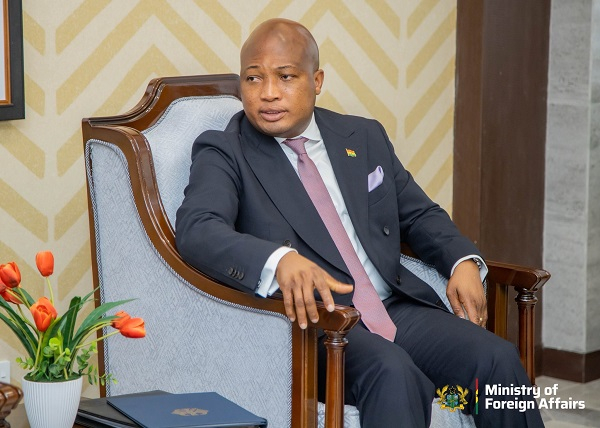- Foreign Affairs Minister Samuel Okudzeto Ablakwa faced scrutiny during an interview on Channel One TV over the NDC government’s slow adoption of his anti-galamsey proposals.
- Host Bernard Avle pointed out that only three of Ablakwa’s 15 recommendations have been implemented since the Mahama administration took office.
- Ablakwa defended the government’s efforts, citing the reclamation of 44 forest reserves and ongoing military deployments.
- He reaffirmed his commitment to the original proposals and called for Key Performance Indicators (KPIs) to hold regional officials accountable.
- Ablakwa suggested that appointees in galamsey-prone areas should be dismissed if they fail to meet performance targets.
- The interview reignited debate over political consistency, environmental accountability, and the urgency of Ghana’s fight against illegal mining.
Samuel Okudzeto Ablakwa, once a fierce critic of the previous administration’s handling of illegal mining, found himself in the hot seat this week as questions mounted over his own government’s pace in tackling galamsey. Appearing on Channel One TV’s The Point of View, the Foreign Affairs Minister was pressed by host Bernard Avle on why the Mahama-led administration had implemented only a fraction of the 15 anti-galamsey measures Ablakwa once championed.
Among the unfulfilled proposals were calls to sack regional ministers and MMDCEs who failed to curb illegal mining, impose a five-year ban on small-scale mining, and overhaul Ghana’s diplomatic presence in China to monitor mining-related activities. Avle noted that only three of the measures had been adopted, prompting a moment of reflection from the minister.
Ablakwa acknowledged the shortfall but remained optimistic, pointing to the reclamation of 44 forest reserves and recent military deployments as signs of progress. He insisted that the fight against galamsey was far from over and that the government was committed to scaling up its efforts.
In a bold policy suggestion, Ablakwa proposed the introduction of KPIs for regional and district officials in galamsey hotspots. Drawing parallels with the foreign ministry’s performance benchmarks for ambassadors, he argued that failure to meet anti-mining targets should be grounds for dismissal.
His remarks come amid growing pressure from civil society and religious groups, some of whom have called for a state of emergency to address the environmental destruction caused by illegal mining. Ablakwa, while supportive of aggressive action, stopped short of endorsing emergency powers, suggesting instead that accountability and enforcement must be strengthened.
The interview has reignited public debate over political consistency and whether Ablakwa’s past advocacy is being matched by present results. As Ghana continues to grapple with the environmental and social fallout of galamsey, the spotlight remains firmly on those in power—and the promises they’ve yet to fulfill.
Watch the video below:
@akosuabakwadwotv Hmmmmmm Asem ooooo eh #foryoupage❤️❤️ #viralvideo #trendingvideo #trending #fyppppppppppppppppppppppp ♬ original sound – Obaatan Pa Akosua Ba



